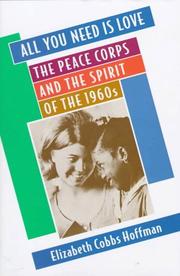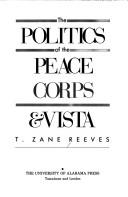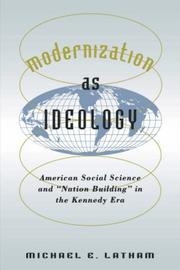| Listing 1 - 6 of 6 |
Sort by
|

ISBN: 0674003802 0674029607 0674016351 9780674029606 Year: 2000 Publisher: Cambridge, Mass. : Harvard University Press,
Abstract | Keywords | Export | Availability | Bookmark
 Loading...
Loading...Choose an application
- Reference Manager
- EndNote
- RefWorks (Direct export to RefWorks)
Traversing four decades and three continents, this story of the Peace Corps and the people and politics behind it is a fascinating look at American idealism at work amid the hard political realities of the second half of the twentieth century.
Peace Corps (U.S.) --- History. --- Cuerpo de Paz (U.S.) --- Cuerpos de la Paz (U.S.) --- Cuerpos de Paz (U.S.) --- Ėnkh Taĭvny Korpus (U.S.) --- Korpus mira (U.S.) --- U.S. Peace Corps --- United States. --- United States Peace Corps --- HISTORY / United States / 20th Century.

ISBN: 0585141037 9780585141039 0817303235 9780817303235 Year: 1988 Publisher: Tuscaloosa, Ala. : University of Alabama Press,
Abstract | Keywords | Export | Availability | Bookmark
 Loading...
Loading...Choose an application
- Reference Manager
- EndNote
- RefWorks (Direct export to RefWorks)
This book traces the ongoing conflict between partisan ideology and organizational culture formulated during the Kennedy years.--Jacket.
Economic History --- Business & Economics --- Peace Corps (U.S.) --- Volunteers in Service to America. --- AmeriCorps*VISTA --- United States. --- VISTA (Volunteers in Service to America) --- Cuerpo de Paz (U.S.) --- Cuerpos de la Paz (U.S.) --- Cuerpos de Paz (U.S.) --- Ėnkh Taĭvny Korpus (U.S.) --- Korpus mira (U.S.) --- U.S. Peace Corps --- United States Peace Corps
Book
ISBN: 9460917356 1283908158 9460917372 9460917364 Year: 2012 Publisher: Rotterdam : Sense Publishers,
Abstract | Keywords | Export | Availability | Bookmark
 Loading...
Loading...Choose an application
- Reference Manager
- EndNote
- RefWorks (Direct export to RefWorks)
This book chronicles the life of a Peace Corps volunteer in Libya in the late 1960's, including the first American account of living through the revolution that brought Gaddafi to power. The author moves from campus protests at the University of Washington in the spring of 1968, to Peace Corps training in Utah and the Navajo Nation in New Mexico, to living and teaching in an isolated village in Libya, to a European summer vacation, to the revolution that led to charges that Peace Corps volunteers were CIA agents, to returning to the U.S. in October, 1969, to witness the anti-war moratorium on the Capital Mall in Washington, D.C. The heart of the story is the author’s own evolving journey as a teacher, during which time he began to question both the official curriculum of English instruction and the broader purposes of teaching for liberation. This is also a story about the author’s education and re-education in Libya as he struggles to learn the rules of everyday life (including the rules of gender and sexuality) as a stranger in the village, and as he begins to see and appreciate the world through somewhat different eyes. Part of his education involved a reconstruction of the history of the village in terms of wave after wave off European colonizers----from the time of the Romans, to the Italian fascist colonizers, to the liberation of the village by the British chasing Rommel’s troops across the desert, to its decline, renaming, and reappropriation as an Arab village. The author brings all this up to the late 1960's by describing the role of U.S. foreign policy in the “development” of Libya in league with global oil, and with the support of the largest air base outside the continental U.S. near Tripoli. This is, finally a coming of age story--about a young man who was desperately looking for something to believe in and live for, and more pragmatically looking for a way out of the draft and Vietnam, and out of an America that seemed to be slipping into collective madness. It is a story (like all coming of age stories) about setting off on a great youthful journey of self-discovery, and a rekindling of the human spirit. Audiences for this book include: college students (undergraduate and graduate) in education, cultural studies, and Arabic studies; former Peace Corps volunteers and those interested in the Peace Corps and its history; readers interested in recent developments in Libya looking for some historical perspective on how Gaddafi came to power and why the revolution turned anti-American; and all those interested in a first-hand account of what America was like at the end of a decade ushered in with Kennedy idealism and the Peace Corps. A powerful story of exile and a search for home, Volunteers of America is the Odyssey of a generation. Awakening to a world in flames, inspired by visions of liberation erupting everywhere, Dennis Carlson heard the chords of freedom echoing all around him and faced the question: Which side are you on? Here is Carlson’s poignant and still timely answer to that question. - Bill Ayers, author of Fugitive Days and many other books on education, Distinguished Professor of Education, University of Illinois, Chicago.
Peace Corps (U.S.) -- History. --- Peace Corps (U.S.) -- Libya. --- Education --- Social Sciences --- Education - General --- Peace Corps (U.S.) --- History. --- Cuerpo de Paz (U.S.) --- Cuerpos de la Paz (U.S.) --- Cuerpos de Paz (U.S.) --- Ėnkh Taĭvny Korpus (U.S.) --- Korpus mira (U.S.) --- U.S. Peace Corps --- United States. --- United States Peace Corps --- Education. --- Education, general. --- Children --- Education, Primitive --- Education of children --- Human resource development --- Instruction --- Pedagogy --- Schooling --- Students --- Youth --- Civilization --- Learning and scholarship --- Mental discipline --- Schools --- Teaching --- Training --- Teachers --- Volunteers --- Biography. --- Volunteer workers --- Persons
Book
ISBN: 1619425831 Year: 2012 Publisher: New York : Nova,
Abstract | Keywords | Export | Availability | Bookmark
 Loading...
Loading...Choose an application
- Reference Manager
- EndNote
- RefWorks (Direct export to RefWorks)
The Peace Corps is an international service organization of the United States Government, which sends Americans abroad to serve the pressing needs of people around the world. The Peace Corps website offers a thorough overview of the Volunteer experience: The types of work Volunteers do, the countries in which Volunteers serve, a step-by-step guide to the application process, and details about how Volunteers live. Also features photos and videos of the Peace Corps experience, Passport Blog, and several social media links.
Peace Corps (U.S.) --- Cuerpo de Paz (U.S.) --- Cuerpos de la Paz (U.S.) --- Cuerpos de Paz (U.S.) --- Ėnkh Taĭvny Korpus (U.S.) --- Korpus mira (U.S.) --- U.S. Peace Corps --- United States. --- United States Peace Corps --- Voluntarism --- Volunteers --- Voluntarism. --- Volunteers. --- International cooperation. --- Developing countries. --- Volunteer workers --- Persons --- Voluntary action --- Volunteer work --- Volunteering --- Volunteerism --- National service --- Associations, institutions, etc. --- Emerging nations --- Fourth World --- Global South --- LDC's --- Least developed countries --- Less developed countries --- Newly industrialized countries --- Newly industrializing countries --- NICs --- Third World --- Underdeveloped areas --- Underdeveloped countries
Book
ISBN: 0817387404 9780817387402 9780817318185 0817318186 Year: 2014 Publisher: Tuscaloosa, Alabama : University Alabama Press,
Abstract | Keywords | Export | Availability | Bookmark
 Loading...
Loading...Choose an application
- Reference Manager
- EndNote
- RefWorks (Direct export to RefWorks)
Heart of Palms is a clear-eyed memoir of Peace Corps service in the rural Panamanian village of Tranquilla through the eyes of a young American woman trained as a community forester.In the storied fifty-year history of the US Peace Corps, Heart of Palms is the first Peace Corps memoir set in Panama, the slender isthmus that connects two continents and two oceans. In her memoir, Meredith Cornett transports readers to the remote village of Tranquilla, where dugout canoes are the mainstay of daily transportation, life and nature are permeated by witchcraft, and a restfu
Americans --- Women ecologists --- Rain forest ecology --- Ecologists --- Women biologists --- Equatorial forest ecology --- Rain forests --- Tropical rain forest ecology --- Forest ecology --- Yankees --- Ethnology --- History --- Ecology --- Cornett, Meredith W., --- Peace Corps (U.S.) --- United States. --- Cuerpo de Paz (U.S.) --- Cuerpos de la Paz (U.S.) --- Cuerpos de Paz (U.S.) --- Ėnkh Taĭvny Korpus (U.S.) --- Korpus mira (U.S.) --- U.S. Peace Corps --- United States Peace Corps --- San Vicente de la Tranquilla (Panama) --- Panama --- Audiencia de Panamá --- Audiencia de Panamá del Nuevo Reino de Tierra Firme --- Estado Federal de Panamá --- Panama (Audiencia) --- Real Audiencia de Panamá --- Republic of Panama --- República de Panamá --- Tierra Firme --- Tranquilla (Panama) --- San Vicente de Tranquilla (Panama) --- S. Vicente Tranquilla (Panama) --- Social life and customs. --- Environmental conditions.

ISBN: 0807860794 9780807860793 0807825336 9780807825334 0807848441 9780807848449 0807825336 9780807825334 9798890867933 Year: 2000 Publisher: Chapel Hill : University of North Carolina Press,
Abstract | Keywords | Export | Availability | Bookmark
 Loading...
Loading...Choose an application
- Reference Manager
- EndNote
- RefWorks (Direct export to RefWorks)
A discussion of the intellectual and cultural dimensions of the Cold War, revealing how social science theory helped shape American foreign policy during the Kennedy administration. It demonstrates how the concept of global modernization became a motivating ideology behind policy decisions.
Social sciences --- Nationalism --- Social change --- Economic development projects --- Development projects, Economic --- Projects, Economic development --- Economic assistance --- Technical assistance --- Change, Social --- Cultural change --- Cultural transformation --- Societal change --- Socio-cultural change --- Social history --- Social evolution --- Consciousness, National --- Identity, National --- National consciousness --- National identity --- International relations --- Patriotism --- Political science --- Autonomy and independence movements --- Internationalism --- Political messianism --- Behavioral sciences --- Human sciences --- Sciences, Social --- Social science --- Social studies --- Civilization --- Political aspects --- History --- Alliance for Progress. --- Peace Corps (U.S.) --- United States. --- Cuerpo de Paz (U.S.) --- Cuerpos de la Paz (U.S.) --- Cuerpos de Paz (U.S.) --- Ėnkh Taĭvny Korpus (U.S.) --- Korpus mira (U.S.) --- U.S. Peace Corps --- United States Peace Corps --- Alianza para el Progreso --- United States --- Developing countries --- Foreign relations --- Economic conditions. --- Nation-building --- 812 Ideologie --- Stabilization and reconstruction (International relations) --- State-building --- Political development --- International relations. Foreign policy --- Economic conditions. Economic development --- Nation-building. --- Aliança para o Progresso --- United States of America
| Listing 1 - 6 of 6 |
Sort by
|

 Search
Search Feedback
Feedback About UniCat
About UniCat  Help
Help News
News